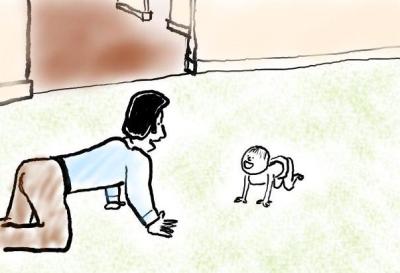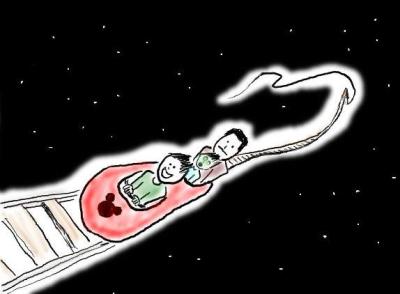If I hadn’t already canceled my cable TV subscription, learning about the media shenanigans described below would make me do it in a heartbeat. (And you should consider it too. Do these assholes deserve hundreds of your dollars every year? Believe me, after a short couple of weeks of withdrawal symptoms you’ll never want to go back.)
Also, if I weren’t already going to vote for John Edwards, the way corporate America is trying to shape my opinion would make me vote for him just for spite.
Please contribute whatever you can to the Edwards campaign on Friday, January 18th, when we’ll be trying to raise a record-breaking $7 million in one day.
John Edwards was the Democratic Vice Presidential Nominee in 2004, a former United States Senator, an accomplished businessman, a great father and husband, and a very well credentialed candidate for President on paper. […]
But despite the apparent three way horserace, the Washington Corporate Media Cocktail Party Elitists has deliberately removed John Edwards from your TV screen for many months. And it happened again today when right wing CNN and ultra right wing Faux Noise showed clips of speeches from Clinton and Obama while not showing clips of speeches from Edwards. […]
Why would the corporate media knowingly freeze out a candidate from national coverage when on paper, the candidate is credentialed, credible, and clearly one of the top three nominees of a major political party?
The answer I believe is as follows: John Edwards is 100% dead serious about destroying the corrupt corporate power structure that has been destroying the American middle class for decades. It’s a structure that is killing the American middle class’s wallets and pocketbooks, schools, health care, ability to own a home, etc… And who owns the Washington Post, the New York Times, 90% of talk radio, NBC, CBS, ABC, CNN […]
Voters in Democratic primaries could give a big middle finger to the national media if they make John Edwards the Democratic nominee for President. An Edwards nomination would be a punch in the gut to the Broders, Russerts, Courics, and other talking head shills in the corporate media. It could be the start of rendering these people utterly powerless.
These corporate shills think they have the power to decide who voters in both parties can select and not select.
Ask corporate lobbyists which presidential contender is most feared by their clients and the answer is almost always the same — Democrat John Edwards. […]
Open attacks on the business elite are seldom heard from mainstream White House candidates in America, despite skyrocketing CEO pay, rising income inequality, and a torrent of scandals in corporate boardrooms and on Wall Street. […]
“I think Hillary is approachable. She knows where a lot of her funding has come from, to be blunt,” said Greg Valliere, chief political strategist at Stanford Group Co., a market and policy analysis group.
Once again in the Corporate Media makes an “Executive Decision” about who America should see as their Viable Choices:
Hillary Clinton
Barack Obama
John McCain
Rudy Giuliani
Mike Huckabee
Mitt Romney
Only these Candidates were the Focus of the latest CNN Poll
Where is John Edwards in this Poll?
(for that matter where is Ron Paul?)
[Edwards has done better than Giuliani, by a long shot!]
[…]
Could it be that CNN did not quite like the Results, when Edwards was included in their last Poll?
[T]he MSM is actively excluding Edwards from the national dialog […]
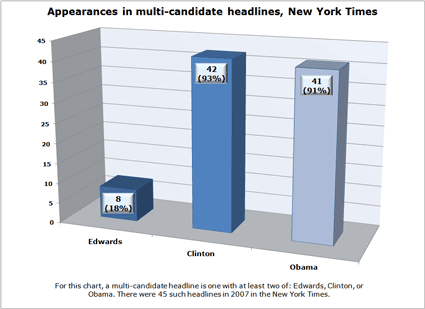
Of all the multi-candidate headlines on Google News, Edwards appears in just 8%, compared to 97% for Obama and 95% for Clinton.
In other words, out of 2,901 multi-candidate headlines, Edwards appeared in only 228. Obama appeared in 2,813. Hillary, 2,761.
This, my friends, is a f**king blackout.
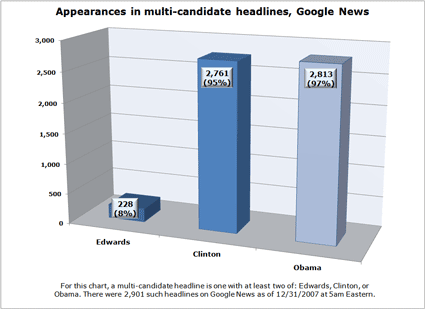
I was perplexed by a recent poll done by Survey USA in conjunction with local Oregon news affiliate KATU News, where Edwards was left out of the polling. In case you didn’t know, Edwards has deep support here in Oregon. Oregonians gave more money to Edwards than they have to Clinton or Obama. […]
I asked the representative at Survey USA why they did not include John Edwards in their recent general election polling. He said that they included him in the primary polls, but when it comes to general election polling they make a judgment call on how viable a candidate is. I told him that didn’t make sense because they included Rudy Giuliani and he has less delegates than Edwards and is less viable as of right now. He said that they make a judgment based on how likely that candidate is to make it to the general election, and if a candidate is less viable they drop them, and if they’re more viable they include them. I reiterated that it still didn’t make sense, and that if that is how they did things, they shouldn’t include Giuliani, and if they did, they should include Edwards since he is more viable.
One of the biggest myths spread by the corporate media and corporate Democrats about the 2008 election is that John Edwards’ populist platform makes him the least electable Democrat. They claim that Edwards’ rhetoric is a fiery, divisive brand of class warfare, and that Americans want a uniter like Barack Obama, or an experienced insider like Hillary Clinton — not an “angry” outsider who will fight against the system.
This myth couldn’t be more false. […]
Since July 1, 2007, there have been ten public polls testing Edwards and McCain in a general election match-up. Edwards wins 7 of these, losing once and tying twice. His average margin of victory is 5.5 points.
No Democrat does better.
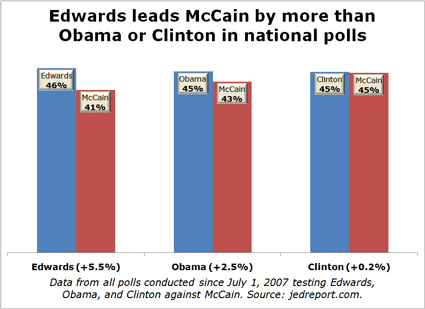
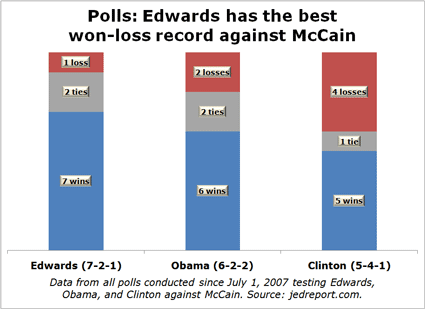
John Edwards defeated an incumbent Republican U.S. Senator in a red state.
Neither Barack Obama nor Hillary Clinton has ever faced a tough Republican opponent. Ever.
[…]
CNN has stopped including John Edwards in its general election polls. In CNN’s most recent poll that actually included Edwards, Edwards beat McCain by by eight points. In that same poll, McCain beat Clinton by two points, and tied Obama.
Fox News has never once — not once, not a single time — done a general election poll featuring John Edwards, despite doing several with Hillary Clinton and Barack Obama.
By now it should be obvious to you that the corporate media doesn’t want you or your neighbor to vote for John Edwards.
Are you going to follow their instructions?
[F]or all the hubbub over the New Hampshire pre-primary polls and how accurate or inaccurate they were, it’s rather interesting that some polls that may have more import have got comparatively minimal coverage.
I speak of the CNN and Rasmussen polls that provide national head-to-head match-ups of presidential candidates. […]
McCain is by far the GOP’s strongest candidate in the general election. […]
John Edwards is by far the Democrats’ strongest candidate in the general election. He is the only one who is not beaten outright by any Republican candidate […]
Hillary Clinton is the weakest Democratic candidate in the general election. She loses to every single Republican except Fred Thompson and Ron Paul […]
Barack Obama is in between Edwards and Hillary Clinton in strength in the general election.
If Edwards wins, the narrative will be about progressivism and populism rising. If Obama wins, the narrative will be about partisanship and ideology declining. If Clinton wins, the narrative will probably be about political skill, or something. Whether or not these narratives are either fair or even accurate matters little right now, since there is precious little time to change them. As such, the apparent truth is that an Edwards victory […] will result in much better press for progressives than either a Clinton or Obama victory. Also, beyond the Democratic nomination narrative, consider the rhetoric Clinton, Edwards and Obama would choose in the general elections. As TocqueDeville has pointed out, if Edwards were to become the nominee, we can expect nine months of populist, anti-corporate, anti-elites rhetoric. For my money, that is far preferable to hearing nine months of rhetoric about experience and getting things done, or nine months of rhetoric about the start of a post-partisan, post-ideological age.
“How long are we going to allow drug companies and insurance companies to run America? America doesn’t belong to them. It belongs to us.”
“For 25 years corporate greed has gotten its way in Washington, destroying American jobs and the middle class, while the establishment did nothing.”
“Corporate greed won’t be stopped without a president who fights for you. Saving the middle class will be an epic battle.”
“It’s time to tell the truth. These big corporations, and their greed, they are stealing your children’s future. We will never change this country unless we are willing to take these people on.”
When is the last time you heard “corporate greed” on your television? I can’t say it doesn’t happen. But when guests say such things on talk shows, they don’t get invited back.
The corporate controlled media has an unwritten rule – don’t bite the hand that feeds. So it’s incredibly rare that the much needed discussion about corporate power over our government is allowed to occur. This despite the fact that corporate power, and its instruments of control over our democracy, is the central issue of our time. […]
I really like Barack Obama. But as brilliant as Obama is, his message of some kind of undefined change, based on a new “tone”, is abstract and unconvincing.
It is as though Obama wants to usher in a new era of “change” without making any enemies. Do you really believe that you can get serious healthcare reform, which must inevitably cost insurance companies billions, without making them your enemy? People have killed for much less.
Do you really believe that the people who run Halliburton, and CIGNA, and Monsanto Inc. are otherwise good people who just haven’t been properly invited under the happy tent? Do you really think a new tone of bipartisanship is what we are missing?
I have had it with you guys.
I didn’t like your candidate.
I hate his vote on the war.
And you NEVER shut up about him. EVER.
Edwards this and EENR that.
In fact…..
Because of you…..
I am taking a second look at him.
Your positive diaries and upbeat outlook, more than anything else, has persuaded me.
So I am looking at his policies and looking beyond his war vote.
I am looking at who he is now. […]
I have gone back and listened to his speeches.
I watched him in the last debate.
I find myself agreeing with him more and more.
a new strategy memo from the Edwards campaign […]
Ultimately we expect the race to narrow to one of the celebrity candidates and us. And when that happens, we are confident that the remaining contests will break in our direction as voters are finally offered a choice the national media has ignored all year — the most progressive, most electable candidate in the race, John Edwards.
While the media has annointed two celebrity candidates, both are flawed. Senator Clinton has electability issues and stands squarely for the status quo. As for Senator Obama, we saw his weakness in New Hampshire. If he was thrown off by Senator Clinton’s attacks, think what will happen when the Republicans throw all they got at him. If Obama is too weak to stand up to the Republicans, and Clinton too corporate, then Democrats will look to another who both stands for change and is willing to fight for it. That one is John Edwards. […]
Facing two $100 million candidates, Edwards is only 7 delegates behind. Heavily outspent and out mediaed, he is right in the fight. […]
It is so early. 98% of voters have not been heard from.
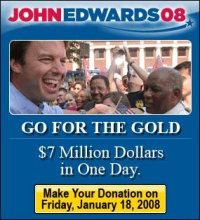 There’s been a lot of talk in these parts about how the media is shutting John Edwards out of the race. He has been excluded from polling. His campaign events have not been covered. Other candidates with less to show for themselves receive more attention. Etc.
There’s been a lot of talk in these parts about how the media is shutting John Edwards out of the race. He has been excluded from polling. His campaign events have not been covered. Other candidates with less to show for themselves receive more attention. Etc.
All of the these things are true. And all of the solutions I’ve seen have merit. We definitely need to put pressure on the media to cover this election fairly. But the media is probably not going to alter course and suddenly exhibit a journalistic integrity that they haven’t even thought about since their freshman year of college. They need to be given a reason to change course; a reason that fits their definition of news.
So either Edwards could engage in a high speed police chase with Britney’s kids on his lap and a missing white girl in the trunk, or he could raise $7 million dollars in one day. […]
Ron Paul has managed to stir up respectable levels of exposure despite his low standings in most polls. […] Paul had validated himself in terms the media can understand — fund raising. Having drawn in a record $6 million dollars in one day went a long ways toward forcing the press to pay attention.
What I want to know is this: If Paul can do it, why can’t Edwards? Edwards has far more support than Paul and he ought to be able to mobilize his supporters to attempt to set a new fund raising record. […]
So I propose that we do so. I would like to suggest Friday, January 18, as the day to shatter both the record and the media’s tinted glass ceiling on coverage.







 No easy targets please; I don’t want to hear how Meatballs III could have benefited from the addition of some talking animals. Of course it could have benefited from the addition of some talking animals. Any change would have been an improvement. (Except for casting someone other than Patrick Dempsey in the lead role, now that he’s all hot and stuff.)
No easy targets please; I don’t want to hear how Meatballs III could have benefited from the addition of some talking animals. Of course it could have benefited from the addition of some talking animals. Any change would have been an improvement. (Except for casting someone other than Patrick Dempsey in the lead role, now that he’s all hot and stuff.)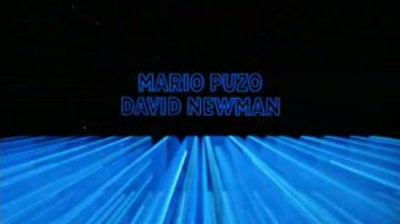
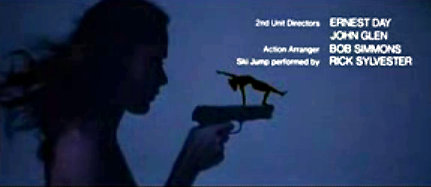

 The Pink Panther (1963) had an opening credits sequence so memorable
The Pink Panther (1963) had an opening credits sequence so memorable 